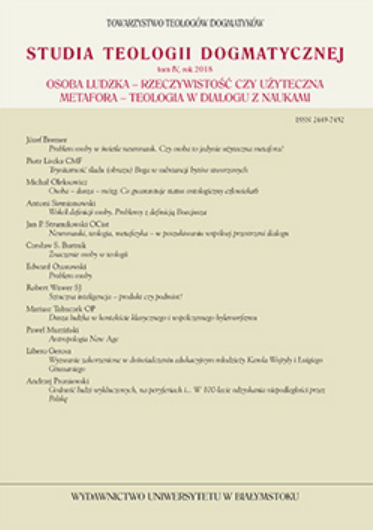Antropologia New Age
New Age Anthropology
Author(s): Paweł MurzińskiSubject(s): Anthropology, Philosophy, Social Sciences, Special Branches of Philosophy, Sociology, Theology and Religion, Philosophy of Religion, Sociology of Religion
Published by: Wydawnictwo Uniwersytetu w Białymstoku
Keywords: cosmos; evolution; consciousness; transformation; enlightenment; self; channeling; divinity; energy; mind; hologram; holistic; pantheism; homo noeticus; kosmos; ewolucja; świadomość; transformacja
Summary/Abstract: This article examines New Age anthropology in light of important changes that are taking place in western culture. These changes are undoubtedly due to many factors, but primarily to a crisis of Christianity, scientific revolution, and postmodern man’s search for alternative answers. The first two points of this article discuss the foundations of this anthropology, which are rooted in new scientific theories and their metaphysical interpretation in light of the concept of Eastern religions such as Hinduism and contemporary gnosis. According to these Eastern ideas and religions, man is an emanation of the Divine Absolute, who is an incarnate particle. This holistic outlook identifies the Creator with creation and is connected with an evolutionary (and not a creationist) worldview. The following point of the article discusses the concept of so-called “transformation of consciousness,” meaning the need to discover one’s true divine identity. This concept asserts that man’s rational identity is an “illusory I.” The final two points of this article present the consequences of this kind of human perception, or the cognitive process based on inner human experience, meaning so-called “enlightenment” (and not on objective Truth), and of the absolutization of the subjective conscience as the supreme tribunal based on having reached enlightenment. In this way, man’s divine identity, which blurs the boundary between that which is divine and that which is human, is the basis of New Age anthropology. In addition, New Age anthropology’s evolutionary understanding of the cosmos, including of man, leads one to conclude that human nature is subject to the processes of change that makes it possible for man to go beyond the limit within which he is understood as being a homo sapiens.
Journal: Studia Teologii Dogmatycznej
- Issue Year: 2018
- Issue No: 4
- Page Range: 146-165
- Page Count: 20
- Language: Polish

